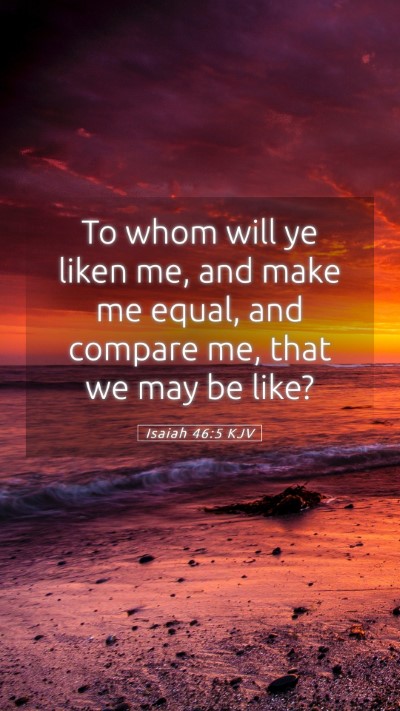Understanding Isaiah 46:5
In Isaiah 46:5, the Lord challenges His people to consider who they can compare Him to, emphasizing His uniqueness and sovereignty. This verse reads:
“To whom will you liken me and make me equal, and compare me, that we may be alike?”
This verse raises profound questions about idolatry and the nature of God, suggesting that no one and nothing can adequately represent the Almighty. Below, we explore the meanings, interpretations, and significance of this powerful scripture through insights drawn from esteemed public domain commentaries.
Bible Verse Meanings
Isaiah 46:5 poses a rhetorical question aimed at highlighting God's incomparable nature. The verse implies that attempts to equate God with anything else reduce the divine to a mere semblance, which is unworthy of His majesty.
Insights from Matthew Henry
Henry emphasizes that this verse belongs to a larger discourse on God's providence and faithfulness. He notes that God challenges Israel's reliance on idols, comparing them to the incomparable nature of the Creator. Henry asserts that true understanding of Scripture involves recognizing who God is in contrast to false gods.
Thoughts from Albert Barnes
Barnes highlights the futility of idolatry in this verse. He explains that God’s question implies His infinite superiority over any created thing and calls readers to understand their place before God. Barnes also underscores the implications of confessing God’s uniqueness in terms of faith and practice.
Analysis from Adam Clarke
Clarke elaborates on the implications of this verse, arguing that man often seeks to create images and ideas that can be more easily grasped than the divine. He adds that this quest for likeness stems from a misunderstanding of God’s omnipotence and pervasive presence in the universe.
Key Themes in Isaiah 46:5
- God's Uniqueness: This verse serves as a reminder of God's singularity in the universe, uncomparable to any human or object.
- Rejection of Idolatry: The challenge posed by God reflects a call to reject the futile worship of idols that cannot deliver divine power or presence.
- Divine Sovereignty: It underscores God’s role as sovereign over all of creation, which is fundamentally different from the limitations of created beings.
Application of Isaiah 46:5
Understanding the implications of Isaiah 46:5 can transform how individuals approach their faith. Here are a few approaches for applying this scripture:
- Personal Reflection: Evaluate any areas of life where one might be prioritizing objects or ideas over a relationship with God.
- Community Discussion: Engage in Bible study groups to discuss God's uniqueness and share insights on how this understanding impacts daily life.
- Worship practices: This verse can enrich one's worship by focusing on the majesty and sovereignty of God without distractions.
Related Bible Cross References
- Psalm 115:4-8: Emphasizes the worthlessness of idols compared to the living God.
- Jeremiah 10:10-16: Highlights God's sovereignty and the futility of relying on created things.
- Revelation 4:11: Affirms God’s supremacy as the creator and sustainer of all life.
Conclusion
In conclusion, Isaiah 46:5 serves as a profound declaration of the Lord's uniqueness and a challenge against idolatry. As believers reflect on this verse, they gain bible study insights that reinforce understanding and application of God's unparalleled nature in their lives and communities. For those seeking further bible verse interpretations and bible verse explanations, this verse stands as a pivotal reminder of the importance of recognizing God in His true light.


